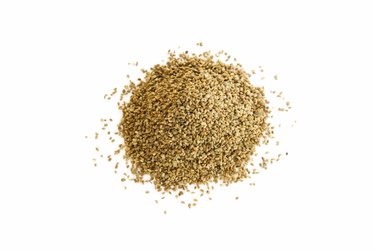
Celery seed tea contains a variety of beneficial oils and active ingredients, including essential omega-6 fatty acids and polyunsaturated fats that help lower cholesterol. Some of the components extracted from celery seeds act as diuretics and may interact with medications or harm unborn babies, so talk to your health care provider to be sure celery seed tea is safe for you to enjoy.
Celery Seed Tea Basics
Video of the Day
Celery seed tea is made by grinding or crushing celery seeds, pouring boiling water over them, then letting them steep for at least 10 minutes but preferably 20 minutes. Then you strain out the seeds and drink the tea. It takes about 1 tablespoon of crushed seeds to make 2 cups of tea.
Video of the Day
While celery seeds are good sources of iron, calcium and manganese, the effect of hot water on minerals isn't as significant as it is on water-soluble nutrients such as vitamin C. As a result, only a small percentage of the minerals will leach into the tea water.
Healthy Fatty Acids
Celery seeds contain a variety of oils that will leach out of the seeds and into your cup of celery tea. The actual amount you'll get varies, depending on the number of seeds and how long they steep. Each cup will contain only a trace amount of fatty acids, however.
One oil you'll get from celery seed tea is linoleic acid. This essential omega-6 fatty acid helps regulate the way cells work. It's also the most abundant fatty acid in your skin, where it maintains the skin's protective barrier.
You'll also get some heart-healthy oleic acid, which is the predominant fatty acid in olive oil. It helps reduce low-density lipoproteins, also known as bad cholesterol, while increasing good cholesterol, or high-density lipoproteins, reports the University of Colorado.
Beneficial Volatile Oils
Celery seed tea contains volatile oils naturally found in the seeds. They're packed with many different oils, but the most important active ingredients come from a group of oils called phthalides.
Phthalides give celery its aroma and serve as beneficial ingredients in celery seed tea. They may also counteract the negative effect of phthalates. When laboratory rats were given a toxic amount of phthalate, oils in celery seed extract improved liver function and helped offset the damage, reported Toxicology and Industrial Health in April 2015. It's not yet known how much effect a serving of celery seed tea has in humans, however.
Potential Health Benefits
Celery seed extract has a long history of being used as a diuretic. Phthalides are responsible for its ability to help your body get rid of excess water.
In one study using lab rats, researchers found that celery seeds lowered the rat's blood pressure, according to a report in the Journal of Medicinal Food in June 2013. But more research is needed to determine whether celery seed extracts have the same impact in people.
An earlier study using human cells grown in the lab found that celery seed extract helped stop the growth of stomach cancer, reported the Asia Pacific Journal in 2011.
Warnings and Concerns
Pregnant women should not drink celery seed tea because it might stimulate bleeding or uterine contractions, warns the University of Maryland Medical Center. People with kidney disease should also avoid consuming any form of celery seed.
Be aware that you may have an allergic reaction to celery seed if you're already allergic to birch pollen. The active ingredients in celery seed may make you more sensitive to sunlight, so be sure to wear sunscreen.
If you take medications, talk to your doctor before drinking celery seed tea because the active ingredients may interact with medications, especially blood-thinning medications, thyroid medications, sedatives and water pills.
- NutritionValue.org: Spices, Celery Seed
- Linus Pauling Institute: Essential Fatty Acids and Skin Health
- University of Colorado, Colorado Springs: Omega-3, 6 and 9 and How They Add Up
- National Institutes of Health: Tox Town: Phthalates
- Examine.com: Celery Seed Extract
- Phthalides.com: Standardized Celery Seed Extract
- Toxicology and Industrial Health: The Therapeutic Applications of Celery Oil Seed Extract on the Plasticizer Di(2-ethylhexyl) Phthalate Toxicity
- Journal of Medicinal Food: Antihypertensive Effect of Celery Seed on Rat Blood Pressure in Chronic Administration
- Asia Pacific Journal of Cancer Prevention: Molecular Mechanisms of Celery Seed Extract Induced Apoptosis via S Phase Cell Cycle Arrest in the BGC-823 Human Stomach Cancer Cell Line
- University of Maryland Medical Center: Celery Seed